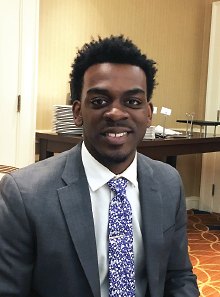My impression of psychiatry had been mostly shaped by what you see on television,” said Norman Harris, a sophomore at Howard University in Washington, D.C., and one of seven new recruits to APA’s Black Men in Psychiatry Pipeline Program.
Now that he’s attended the annual meetings of APA and the American Academy of Child and Adolescent Psychiatry last year, as well as the meeting of the Black Psychiatrists of America (BPA) in Memphis last month, Harris has a more accurate picture of what a career as a psychiatrist is like. He’s changed his major from sports medicine to psychology, and while he has long planned to go to medical school, he’s now switched his goal from emergency medicine to psychiatry. Additionally, Harris is being mentored by APA President-elect Altha Stewart, M.D.
“I’ve gotten a chance to see that there are many different ways you can spend a career as a psychiatrist,” Harris told Psychiatric News in an interview at the BPA meeting in Memphis. “You can work in a hospital, in the community, in the prison system, or in an administrative position, among other settings. I’m very interested in psychiatry now.”
Ranna Parekh, M.D., M.P.H., director of APA’s Division of Diversity and Health Equity (DDHE), said the Black Men in Psychiatry Pipeline Program grew out of the 2015 report “Altering the Course: Black Males in Medicine” by the Association of American Medical Colleges. It began as a pilot at Howard University but has been extended to other colleges and universities.
“The program began in late 2015 with three undergraduate students from Howard University and now includes seven men from across the country,” she said. “Given the overall drop in the number of black male applicants to medical school—1,337 in 2014 from 1,420 in 1978—despite the increase in the number of black male college graduates over the last three decades, we knew that the leaky pipeline to medicine/psychiatry was at the undergraduate level. For that reason, we chose to target this demographic during the early years in college, before any career decision had been finalized.”
The program offers a range of opportunities including DDHE support for attendance at APA’s Annual Meeting and other professional meetings. In addition to having access to a “family” of mentors, each man receives sponsorship from a mid-career or senior APA member.
Parekh said the program represents a first effort to recruit minority undergraduates into careers in psychiatry, one that will be extended next year to other groups at risk of underrepresentation in medicine including women of color.
“This program is really a flagship for us to develop programs for other groups that are underrepresented in our field,” she told Psychiatric News. “I believe some of the lessons we are learning about recruiting young black men through this program can be helpful more generally as we deal with the psychiatrist workforce shortage.” ■

